Motivating Remote Employees: Tips And Tricks

Employee motivation plays an important role in ensuring employee productivity. Therefore managers try their level best to motivate employees whether they are working as a remote team or performing their tasks in an office setting. However, it might be difficult for managers to motivate remote team members for some reasons. Why might a remote workforce be difficult to motivate? The answer is not simple, we will have to answer from different perspectives.
As the COVID-19 pandemic continues to spread, more and more businesses are being forced to allow their employees to work remotely. While there are some definite advantages to this arrangement, there are also some challenges that need to be overcome. One of the biggest challenges is keeping your remote employees motivated.
In this blog post, we will discuss the tips and tricks to motivate remote workers. So, keep reading to learn more.

As reported by the NorthOne website, 58 % of the American population is working remotely at least in some part, and 41% do so full-time. This number has skyrocketed from 17 % pre-pandemic when people could work five days per week without having any coworkers around them. Additionally, a recent study by Owl Labs showed that 73% of all departments will have remote workers in the next few years. This knowledge makes motivating employees who work from home more important than ever. Thus, managers will be looking for ways to motivate their remote employees.
Surprisingly, the study found that 77% of individuals working remotely feel that they are more productive outside the office.

However, for some reason companies do not allow remote working and do not want to provide equipment and technology to their remote employees.
The above statistics show that keeping remote employees motivated becomes a challenge for managers. To successfully motivate remote employees and ensure their productivity,which is the priority of all managers.
The question arises here: how can remote workers be motivated? No worries, every challenge has a solution as well. Several research studies suggest a variety of solutions or tips to keep remote workers motivated. Some of them will be discussed in this blog. But before going into depth it is suitable to understand the reasons why remote workers need to be motivated or why they feel less motivated while working from home.
Importance of Motivating Remote Workers
Did you know that, according to FinanceBuzz, 69% of people have worked from a hotel room, 61% from the airport, 46% on a plane, and 14% on a train? Interesting findings aren’t they?
Thus, a remote worker is an employee who does not work in a traditional office setting. They may work from home, in a co-working space, or even while travelling.
There seems flexibility at work, however, one of the main issues with remote working is that it can be difficult for managers to keep track of and motivate their employees. This can lead to a decrease in productivity and morale.
That’s why managers need to understand how to motivate their remote employees so that they can continue to achieve their goals.
7 Reasons Why Remote Workers May Feel Demotivated
Although there are many benefits to working remotely, there are also challenges that can lead to a lack of motivation. Now, we will discuss 7 reasons why remote workers may feel demotivated and suggest ways to overcome them.
Reason # 1. Isolation from colleagues:
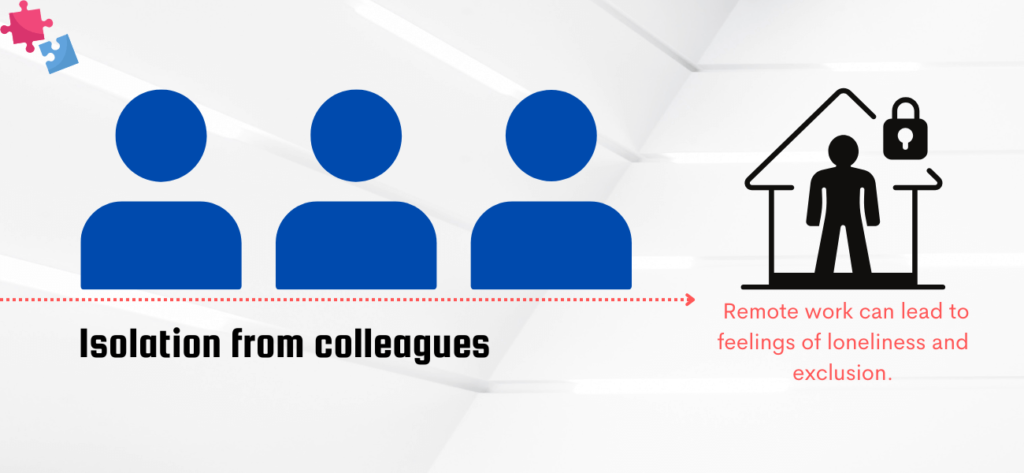
When you work remotely, you can often feel isolated from your colleagues. This can lead to feelings of loneliness and exclusion. To combat this, try to schedule regular video calls or coffee chats with your co-workers. Additionally, try to take advantage of any company-sponsored events or meetups.
Reason # 2. Inconsistent feedback:
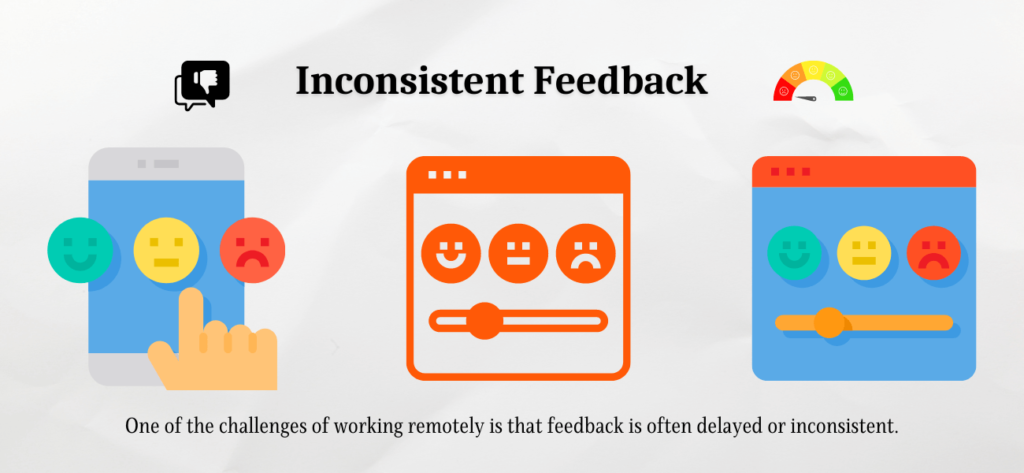
One of the challenges of working remotely is that feedback is often delayed or inconsistent. This can be frustrating for employees who are used to receiving frequent feedback in a traditional office setting. To overcome this, try to schedule regular check-ins with your manager. Additionally, make sure to document all tasks and accomplishments so that you have a record of your successes.
Reason # 3. Lack of clear goals:

Another challenge of working remotely is that it can be difficult to set clear goals. Without the structure of a traditional office setting, it can be easy to get caught up in distractions or become overwhelmed by the sheer number of possibilities. To combat this, try to set realistic and achievable goals for each day or week. Additionally, consider using a task management tool such as Trello or Asana to help you stay organized and on track.
Reason # 4. Difficulties with time management
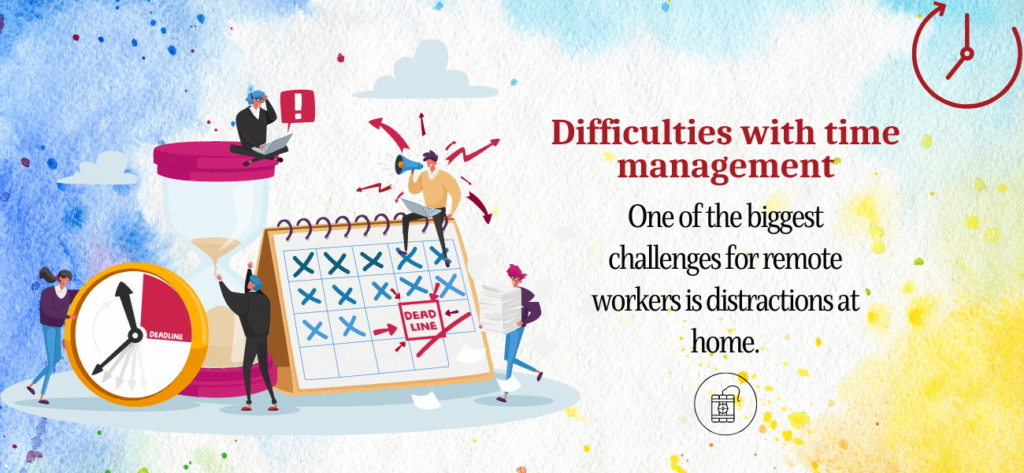
Managing time is often difficult for remote workers since there are no set hours for work. This can lead to feeling like you are always working or never really taking a break. To overcome this challenge, try to set regular office hours for yourself and stick to them as much as possible. Additionally, make sure to take some time each day for yourself – even if it’s just 15 minutes – so that you can relax and recharge.
Reason # 5. Distractions at home:

One of the biggest challenges for remote workers is distractions at home. With no one around to hold you accountable, it can be easy to get sidetracked by things like household chores or errands. To combat this, try to create a dedicated workspace for yourself – even if it’s just a corner of your kitchen table – and make sure to stick to it during working hours. Additionally, try to keep your personal and professional life separate as much as possible so that you can focus on work when it’s time to do so.”
Reason # 6. Technical difficulties:
Another common challenge faced by remote workers is technical difficulties such as spotty internet connection or unreliable equipment. To overcome this challenge, make sure you have all the necessary equipment and software before starting your work day.
Additionally, if you live in an area with an unreliable internet connection, be sure to have a backup plan in place – such as working at a local coffee shop or library – in case of an emergency.
In total, 84% of individuals who work remotely confessed to having an unreliable internet connection at some point, and 86% stated they regularly experience slow speeds.
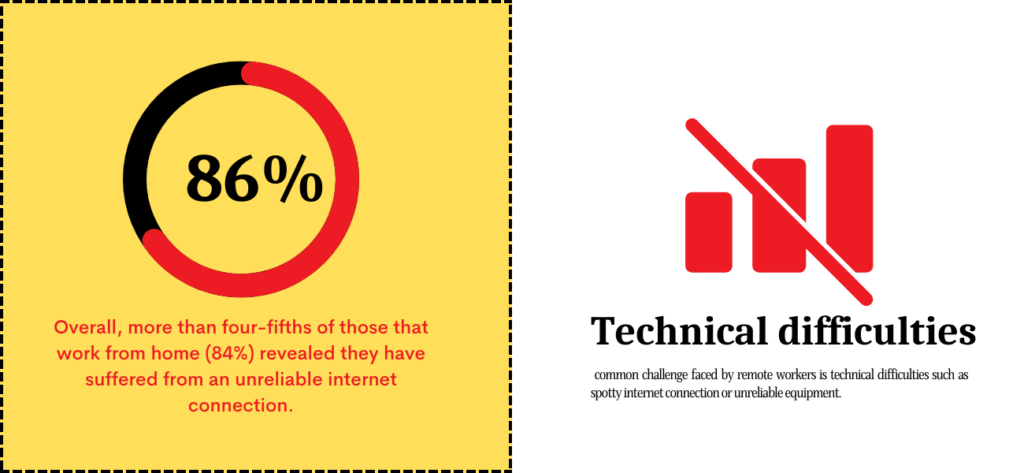
Reason # 7. Feeling disconnected from the company culture:
Finally, one of the challenges faced by remote workers is feeling disconnected from the company culture. If you’re not physically present in the office, it can be easy to feel like you’re missing out on important bonding experiences with your co-workers.” To combat this, “try attending company-sponsored events or meetups,” or participating in regular video calls or coffee chats with your colleagues.”
7 Effective Tips To Motivate Your Remote Employees
As remote work has become increasingly popular in the past few years, employers need to find ways to motivate their teams who are working remotely. With remote employees, it can be difficult to ensure that their morale and productivity remain high. Fortunately, employers can use several strategies to motivate their remote employees. Here are 7 effective tips to help motivate your remote employees:
Tip #1. Define Clear Expectations
The first step in keeping your remote employees motivated is to make sure that they know what is expected of them. When everyone is in the office, it’s easy to keep tabs on what everyone is working on and how they are contributing to the team’s overall goals. But when people are scattered all over the place, it can be more difficult to stay on top of things.
That’s why it’s important to set clear expectations for your remote employees from the outset. Let them know what you expect them to accomplish each day, each week, and each month. And be sure to check in regularly to see how they are progressing and offer feedback—both positive and constructive.
Although working from home has its perks, some remote workers may not feel as motivated due to the lack of a traditional office setup and connection with their colleagues.
More than half of business executives agree that a well-handled company culture is a key to keeping remote employees motivated.
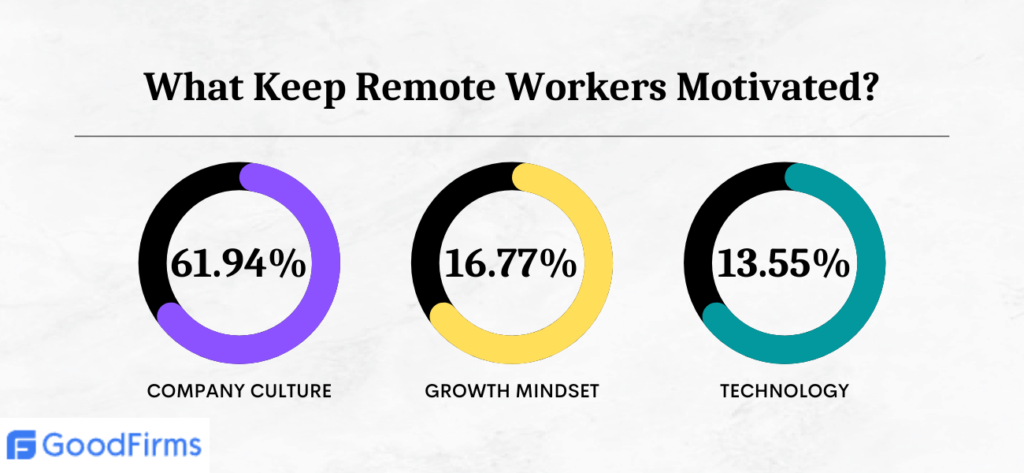
Tip # 2. Encourage Frequent Communication
Another key to motivating remote employees is encouraging frequent communication. It can be easy for people working remotely to feel isolated and cut off from the rest of the team. To prevent this from happening, make an effort to encourage frequent communication between team members.
There are a few different ways you can do this. First, set up regular video or conference calls so everyone can check in with each other regularly.
You could also create a chat group where team members can ask questions, share ideas, or just chat about non-work-related things. Whatever methods you use, just make sure that everyone feels like they have a way to communicate with each other frequently.
Tip # 3. Make Use of Technology
There are a lot of great tools and technologies out there that can help managers keep track of their remote employees’ work and progress. Make use of these tools to stay up-to-date on what everyone is working on and how they are doing.
Some of the most popular tools for managing remote teams include project management software like Asana or Trello, time tracking software like Toggl or RescueTime, and communication tools like Slack or Zoom. These tools can help you stay organized, track progress, and communicate with your team easily—all from one central location.

Most importantly, invest in quality equipment that allows your remote staff members to do their jobs without issue; this includes fast computers with reliable internet connection as well as noise-cancelling headphones if needed!
Doing this ensures that any technical difficulties won’t impede their productivity – another great way of showing them that you value their contribution and want what’s best for everyone involved!
Tip # 4 Offer Incentives
One of the best ways to motivate anyone—remote worker or not—is with incentives. If you want your remote employees to go above and beyond, offer them incentives to make it worthwhile. Some examples of incentives you could offer include bonuses for meeting deadlines early, gift cards for completing difficult tasks, or additional paid time off for going above and beyond expectations consistently.
Whatever you decide to offer as an incentive, make sure it’s something that will genuinely motivate your team members and make them feel appreciated and valued for their hard work.
A report found that more than 69% of the workers admit recognition and reward programs help to motivate them to stay at their present jobs. Apart from the Data, employee recognitions are also a great tool to incentivize the employees.
These programs provide the foundation for an employee’s incentive experience. Companies that recognize employees frequently and in real-time are more likely to retain them, with a 4% increased chance, or increase employee engagement by 34%.

Tip # 5 Provide Rewards for A Job Well Done:
Provide rewards for a job well done. Whether this means offering monetary bonuses or simply verbal recognition, rewarding your remote employees will not only boost morale but also incentivize hard work in the future. You could also consider offering merit-based promotions or additional time off as an incentive for excellent performance. If you want your employees to be happier and more productive, implementing an incentive program is a great way to do so – it has been shown to increase employee morale and performance by up to 44%. In addition, 85% of employees feel more inclined to work harder when they have an incentive. Therefore, having an employee reward program is beneficial for any business.

Tip # 6 Get Creative with Team-Building Activities:
Get creative with team-building activities. Although virtual team-building activities may seem more challenging than in-person gatherings, there are plenty of fun exercises that can be done virtually as well! For instance, try playing online games like trivia or bingo together during breaks or hosting virtual happy hours or coffee chats where everyone can talk freely about non-work topics.

Tip # 7 Schedule Regular Check-ins
Schedule regular check-ins with each employee individually over video chat or phone call at least once a month. This will allow the employee to express any concerns they have while providing you with valuable insight into how your team is doing overall. Additionally, it will help build stronger relationships between yourself and each of your remote employees so they feel more connected and motivated to do their best work for you!

Apart from keeping track of progress made on tasks through tracking software like Trello or Asana so everyone knows exactly what needs to be done and when it’s due by – this way no one falls behind! Additionally, make sure all projects have clear instructions outlining any necessary steps needed for completion so there’s no confusion among team members.
Providing educational opportunities that focus on career growth such as webinars about industry trends or specialized classes related to their field of work so they stay up-to-date on the latest advancements in technology or knowledge related to their job position! This will not only help them stay sharp but also make them feel valued because they know you care about helping them further their professional development.
Conclusion:
Motivating remote employees may seem like a daunting task, but it doesn’t have to be. By defining clear expectations, encouraging frequent communication, making use of technology, and offering incentives, you can create an environment where your remote employees feel motivated and engaged. With the right support and guidance, you can ensure that your team is working together effectively to achieve success.


